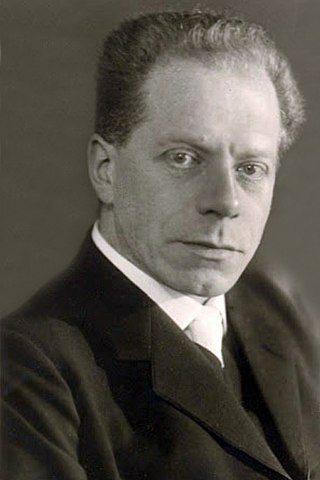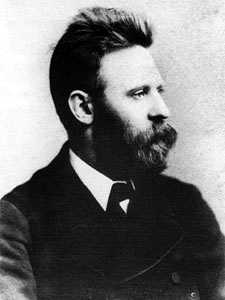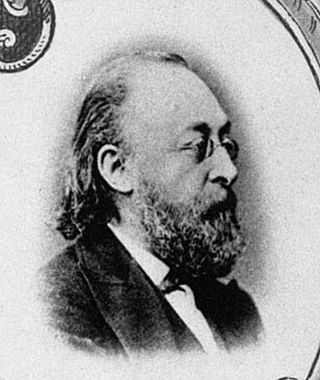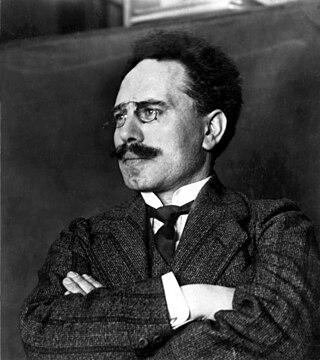Related Research Articles

Friedrich Engels was a German philosopher, political theorist, historian, journalist, and revolutionary socialist. He was also a businessman and Karl Marx's lifelong friend and closest collaborator, serving as a leading authority on Marxism.

Leonard Nelson, sometimes spelt Leonhard, was a German mathematician, critical philosopher, and socialist. He was part of the neo-Friesian school of neo-Kantianism and a friend of the mathematician David Hilbert. He devised the Grelling–Nelson paradox in 1908 and the related idea of autological words with Kurt Grelling.

Eduard Bernstein was a German Marxist theorist and politician. A prominent member of the Social Democratic Party of Germany (SPD), Bernstein has been both condemned and praised as a "revisionist" who challenged major aspects of Karl Marx's thought. A key influence on the European social democratic movement, Bernstein argued for legal legislation over revolutionary action, and a gradual democratization and socialization of capitalist society.

Ferdinand August Bebel was a German socialist activist and politician. He is best remembered as one of the founders, with Wilhelm Liebknecht, of the Social Democratic Workers' Party of Germany (SDAP) in 1869, which in 1875 merged with the General German Workers' Association to form the Social Democratic Party of Germany (SPD), which became the leading party of the social-democratic movement in Germany. Bebel served as a member of the Reichstag from 1871 to his death in 1913, and as chairman of the SPD from 1892 to 1913.

Friedrich Naumann was a German liberal politician and Protestant parish pastor. In 1896, he founded the National-Social Association that sought to combine liberalism, nationalism and (non-Marxist) socialism with Protestant Christian values, proposing social reform to prevent class struggle. He led the party until its merger into the Free-minded Union in 1903. From 1907 to 1912 and again from 1913 to 1918, he was a member of the Reichstag of the German Empire.

Johann Joseph "Hans" Most was a German-American Social Democratic and then anarchist politician, newspaper editor, and orator. He is credited with popularizing the concept of "propaganda of the deed".

Hugo Haase was a German socialist politician, jurist and pacifist. With Friedrich Ebert, he co-chaired of the Council of the People's Deputies during the German Revolution of 1918–19.

The Anti-Socialist Laws or Socialist Laws were a series of acts of the parliament of the German Empire, the first of which was passed on 19 October 1878 by the Reichstag lasting until 31 March 1881 and extended four times.

Karl Theodor Ferdinand Grün, also known by his alias Ernst von der Haide, was a German journalist, philosopher, political theorist and socialist politician. He played a prominent role in radical political movements leading up to the Revolution of 1848 and participated in the revolution. He was an associate of Heinrich Heine, Ludwig Feuerbach, Pierre-Joseph Proudhon, Karl Marx, Mikhail Bakunin and other radical political figures of the era.

Karl Paul August Friedrich Liebknecht was a German revolutionary socialist and anti-militarist. A member of the Social Democratic Party of Germany (SPD) beginning in 1900, he was one of its deputies in the Reichstag from 1912 to 1916, where he represented the left-revolutionary wing of the party. In 1916 he was expelled from the SPD's parliamentary group for his opposition to the Burgfriedenspolitik, the political truce between all parties in the Reichstag while the war lasted. He twice spent time in prison, first for writing an anti-militarism pamphlet in 1907 and then for his role in a 1916 antiwar demonstration. He was released from the second under a general amnesty three weeks before the end of the First World War.

Martin Leo Arons was a German physicist and social democratic politician. He was the namesake of the Lex Arons, a law which disallowed members of the Social Democratic Party of Germany to teach at Prussian universities.
Revolutionary socialism is a political philosophy, doctrine, and tradition within socialism that stresses the idea that a social revolution is necessary to bring about structural changes in society. More specifically, it is the view that revolution is a necessary precondition for transitioning from a capitalist to a socialist mode of production. Revolution is not necessarily defined as a violent insurrection; it is defined as a seizure of political power by mass movements of the working class so that the state is directly controlled or abolished by the working class as opposed to the capitalist class and its interests.
In Marxist philosophy, the dictatorship of the proletariat is a condition in which the proletariat, or working class, holds control over state power. The dictatorship of the proletariat is the transitional phase from a capitalist to a communist economy, whereby the post-revolutionary state seizes the means of production, mandates the implementation of direct elections on behalf of and within the confines of the ruling proletarian state party, and institutes elected delegates into representative workers' councils that nationalise ownership of the means of production from private to collective ownership. During this phase, the organizational structure of the party is to be largely determined by the need for it to govern firmly and wield state power to prevent counterrevolution, and to facilitate the transition to a lasting communist society.
Orthodox Marxism is the body of Marxist thought which emerged after the deaths of Karl Marx and Friedrich Engels in the late 19th century, expressed in its primary form by Karl Kautsky. Kautsky's views of Marxism dominated the European Marxist movement for two decades, and orthodox Marxism was the official philosophy of the majority of the socialist movement as represented in the Second International until the First World War in 1914, whose outbreak caused Kautsky's influence to wane and brought to prominence the orthodoxy of Vladimir Lenin. Orthodox Marxism aimed to simplify, codify and systematize Marxist method and theory by clarifying perceived ambiguities and contradictions in classical Marxism. It overlaps significantly with instrumental Marxism.

Karl Johann Kautsky was a Czech-Austrian philosopher, journalist, and Marxist theorist. A leading theorist of the Social Democratic Party of Germany (SPD) and the Second International, Kautsky advocated orthodox Marxism, which emphasized the scientific, materialist, and determinist character of Karl Marx's work. This interpretation dominated European Marxism for two decades, from the death of Friedrich Engels in 1895 to the outbreak of World War I in 1914.
Karl Friedrich Schapper was a German socialist and labour leader. He was one of the pioneers of the labour movement in Germany and an early associate of Wilhelm Weitling and Karl Marx.

Moritz Rittinghausen was a German advocate and theorist of direct democracy, an early socialist and a politician.

The following outline is provided as an overview of and topical guide to Marxism:

The Majority Social Democratic Party of Germany was the name officially used by the Social Democratic Party of Germany (SPD) between April 1917 and September 1922. The name differentiated it from the Independent Social Democratic Party, which split from the SPD as a result of the party majority's support of the government during the First World War.

Sozialistische Monatshefte was a German journal edited by Joseph Bloch from 1897 to 1933 and published by the Verlag der Sozialistischen Monatshefte in Berlin.
References
- ↑ Engels, Friedrich. "Letter to J. Bloch". Marxists.org. Marixsts.org. Retrieved 4 October 2024.
- ↑ "Bloch, Joseph" (PDF). Deutsche Biographie-Onlinefassung. Deutsche Biographie. Retrieved 4 October 2024.
- ↑ Bloch, Joseph (1907). Die Entwickelung des Unendlichkeitsbegriffs von Kant bis Hermann Cohen.
- ↑ Mosse, Werner (2009). Juden im Wilhelminischen Deutschland, 1890–1914. Ein Sammelband. Tübingen.
{{cite book}}: CS1 maint: location missing publisher (link) - ↑ Osterroth, Franz (1960). Biographisches Lexikon des Sozialismus. Verstorbene Persönlichkeiten. Bonn: Verlag JHW Dietz Nachf.